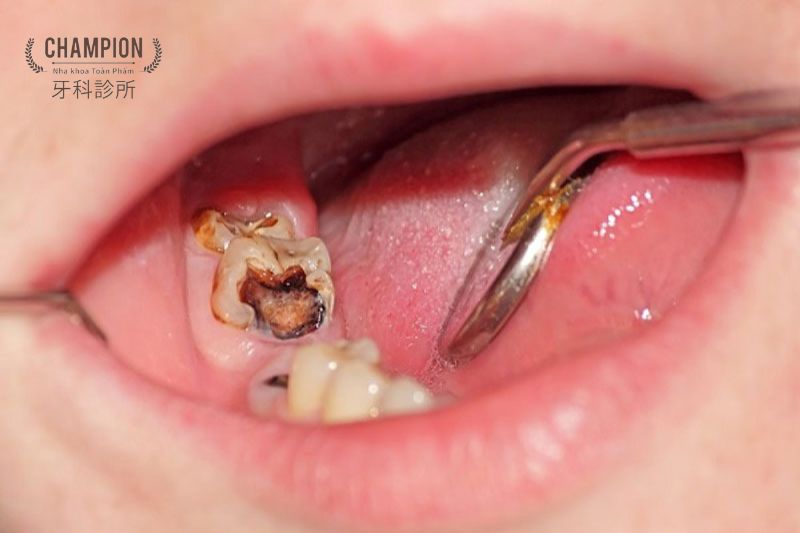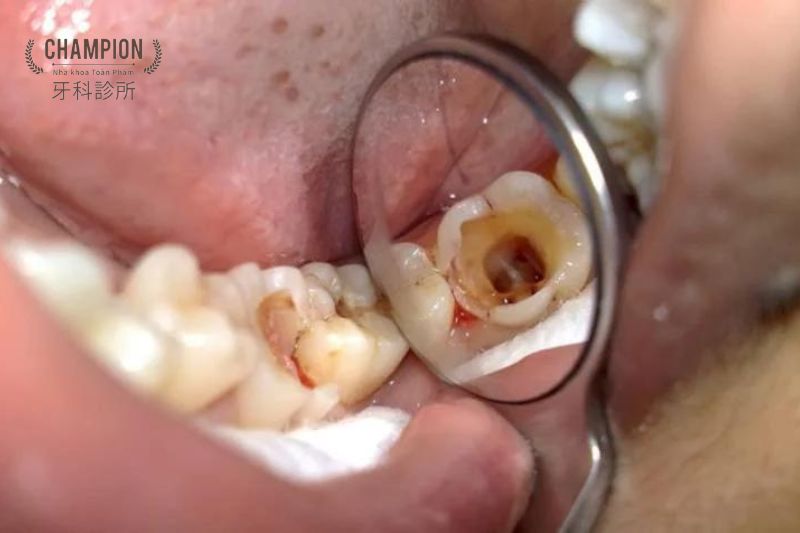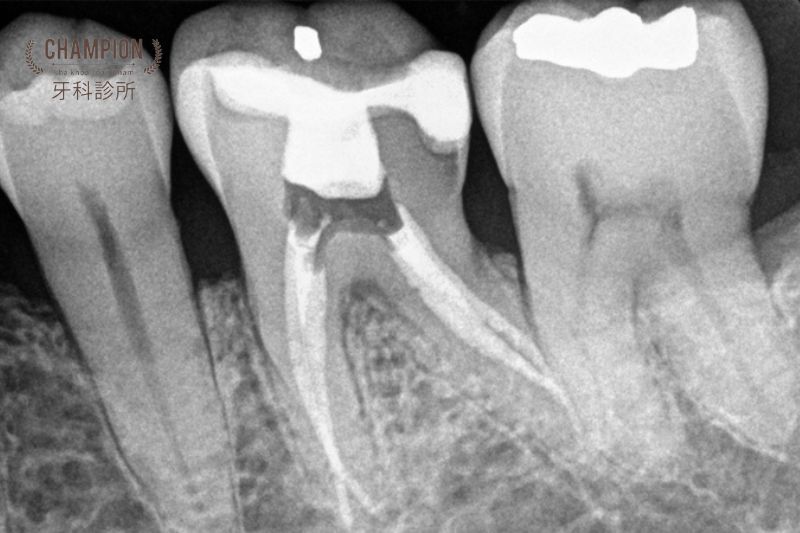Pulp necrosis is a serious issue in the field of dentistry, causing many individuals to confront uncomfortable and painful problems. This article by Champion Dentistry aims to provide you with a clearer understanding of pulp necrosis, covering its causes, symptoms, and the most effective treatment methods.
What is dental pulp necrosis?
Each tooth plays a crucial role, housing dental pulp, a vital connective tissue extending from the tooth root to the crown. The main structure of dental pulp includes the pulp chamber and the root canals, forming a complex system with numerous nerves and blood vessels. Dental pulp not only serves in temperature and pressure sensation but also ensures the overall health of the oral cavity.
When dental pulp undergoes necrosis, it means the pulp is dead and completely destroyed, losing its ability to protect oral health. The main causes of dental pulp necrosis include untreated tooth decay, tooth trauma, or dental treatments causing pulp damage.
The occurrence of dental pulp necrosis not only affects eating ability but also creates inconveniences in daily activities. Pulp death can lead to pain, inflammation, and even a decrease in the quality of life. Moreover, dental pulp necrosis can also impact other organs in the body due to overall health deterioration.

How to recognize dental pulp necrosis?
Dental pulp necrosis often does not cause clear pain in the initial stages. However, some warning signs may include:
- Discoloration of teeth: Teeth turning yellow, brown, or even black due to degeneration of pulp tissue.
- Brittle, easily broken teeth: The lack of nourishment to the teeth makes them lose their strength, becoming prone to cracking or breaking.
- Prolonged or temperature-sensitive discomfort: This may indicate pulp inflammation, a precursor to pulp necrosis.
- Pus drainage from the gums: Severe infection can cause pus to flow from the gums surrounding the affected tooth.

Common Causes of Dental Pulp Necrosis
Dental pulp necrosis is a prevalent dental issue that often stems from various causes, causing significant damage to oral health. Here are some primary causes of dental pulp necrosis:
Tooth Decay
Tooth decay is the leading cause of dental pulp necrosis. Decay forms as bacterial plaque accumulates, creating cavities on the tooth enamel. If not detected and treated early, these cavities can grow deeper into the tooth pulp. When decay infiltrates the dental pulp, it can lead to infection and ultimately result in necrosis.
Chronic Pulpitis
Chronic pulpitis is another cause of dental pulp necrosis. This arises from inflammation of the dental pulp, often stemming from untreated cavities, trauma, or multiple extensive dental restorations. Prolonged pulp inflammation can diminish the pulp's function, becoming irreversible and contributing to pulp necrosis.
Tooth Trauma
Tooth trauma is also a factor contributing to dental pulp necrosis. If a tooth experiences a strong impact or injury, the dental pulp may be damaged, initiating the necrotic process.

>> See more: Effective Permanent Solutions for Toothache Relief
The Dangers of Dental Pulp Necrosis and Potential Complications
Dental pulp necrosis not only causes pain and discomfort but also carries various risks and dangerous complications if not addressed promptly.
Dental Abscess and Jaw Bone Inflammation
When dental pulp undergoes necrosis, bacteria can spread and form dental abscesses. The accumulation of necrotic fluid can create pressure, causing pain and jaw bone inflammation. If left untreated, dental abscesses can progressively destroy the jawbone, leading to severe structural and functional issues.
Tooth Loss
Infection from necrotic dental pulp can extend to supporting structures, weakening connective tissues and jawbone. Severely affected teeth may transition from periapical inflammation to periapical abscess, necessitating tooth extraction to prevent bacterial spread and safeguard neighboring teeth's health.
Fractured or Broken Teeth
Dead dental pulp results in the loss of internal nourishment, reducing the tooth's resistance. Under the impact of strong chewing forces, the tooth loses its ability to self-protect and becomes prone to fractures or breaks. Treating the pulp and applying an external crown may be a solution to protect the tooth from undesired damage.

Common Contemporary Treatment Methods for Dental Pulp Necrosis
Here are common treatment options for dental pulp necrosis:
Dental Filling
Dental filling is a common method to halt cavity development and protect the dental pulp. In this procedure, a dentist removes decay and uses a suitable filling material to seal the cavity. Dental filling is effective when cavities are detected early and cause minimal damage to the dental pulp.
Root Canal Therapy
Root canal therapy is a treatment option for advanced cases of dental pulp necrosis. In this procedure, the dentist removes dead tissue from the pulp chamber and root canals. Subsequently, gutta-percha is used to seal the root canals, preventing infection. In some cases, root canal therapy may be performed multiple times to ensure the tooth's health is maintained.
Pulp Removal
In cases where pulpitis is irreversible, the dentist may decide to remove the dead pulp to prevent infection spread. This procedure typically involves creating a small opening in the tooth and manually removing the dead pulp.
Tooth Replacement
When dental pulp necrosis is severe and irreversible, the dentist may recommend replacing the affected tooth entirely. This process may involve extracting the tooth and replacing it with dentures, dental implants, or other replacement methods.
Conclusion
Dental pulp necrosis is not only a straightforward dental issue but also brings severe consequences for oral and overall bodily health. Timely care and treatment are crucial to preventing dangerous complications and maintaining comprehensive oral health.
Vietnamese & English: (028) 5411-2295
中文: (028) 5411-2297 172 Nguyen Luong Bang, Tan Phu Ward, District 7, Ho Chi Minh City.
Fanpage: Champion Dental Clinic 牙科診所
Zalo: Champion Dental Clinic
Youtube: Champion Dental Clinic 牙科診所
 Champion Dental Clinic
Champion Dental Clinic



